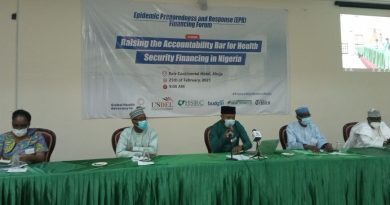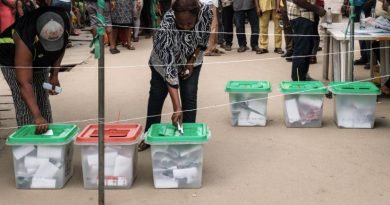LEGISLATIVE SYCOPHANCY: The Bola Ahmed Tinubu University Debacle (Part 2)
A Parody by Dr. Iyke Ezeugo
In Part 2 of my legislative sycophancy parody, out of the 69 meaningful bills in my knowledge bank crafted to positively impact our nation in this critical time, I have proposed only 13 practical areas for the National Assembly to focus on as the low hanging fruits right now. I limited this to 13 for reasons of keeping the article within readable length and for want of space.
My approach, as usual, is a blend of satire and practical solutions. While I may dish out more in Parts 3 and 4, let’s see if this first installment provokes a response. Will it ignite anger, defensiveness, or perhaps even a resolution to turn away from sycophantic legislation and prioritize the real needs of our people and matters of urgent public interest?
Caveat: These ideas are not copyrighted. They should feel free to use them, but let them please ensure they are implemented effectively and with relevant nuances to serve the best interests of our nation and its people.
E’heh, back to business. In the grand circus of Nigerian politics, where legislative performers dazzle not with skill but with the finesse of their flattery, we return to the spectacle of the 10th Assembly. If Part 1 was the appetizer, where we tasted the absurdity of immortalizing a living president through an overpriced academic shrine, then Part 2 offers a satirical full-course meal, served with the sour sauce of reality.
But now, my people, we must rise above the mockery, if only for a moment. Let us climb to loftier heights and imagine an alternative universe—a universe where Nigeria’s lawmakers focus not on genuflection but on governance, where the agenda is driven by substance, not sycophancy. Yes, it’s a stretch, but stay with me.
Beyond Sycophancy: Charting a New Course for Nigeria’s Legislature
In Part 1, some laughed, some cried and others just browsed over news of the bill for establishment of the Bola Ahmed Tinubu Federal University of Nigerian Languages—a monument to political vanity so absurd that it makes one long for the days when lawmakers debated serious issues like, I don’t know, fixing electricity or preventing the economy from spiraling into the abyss. But let’s pause the satire for a moment to ask: What if our lawmakers had the courage to put Nigeria first?
Now, before you accuse me of excessive idealism—yes, I’m aware we are asking much from an assembly that seems more concerned with raising the president’s ego than raising the standard of living for Nigerians—but bear with me. For a brief, shining moment, let’s entertain the thought that they could redirect their energies toward *actual governance*. Imagine, if you will, a legislative agenda not obsessed with personal aggrandizement, but one that tackles the pressing issues that weigh down the Nigerian people.
Shall we?
Key Legislative Areas that Actually Matter
Instead of wasting ₦100 billion on a glorified monument to sycophancy, here are thirteen (13) critical areas the 10th Assembly could address, if only they chose to embrace their true legislative duties to serve the electorates they are meant to represent, instead of replace. Don’t forget, some are representing while others are replacing their constituency people. Smiles.
The more noble course:
In keeping with my promise to lend them ideas, below are the 13 Crucial Bills for Nigeria’s National Assembly to pursue now for the right impact:
1. Agricultural Revolution and Food Security Bill
*Key: National Agricultural Transformation and Food Security Act.
*Gap: Nigeria’s dependence on imported food, despite abundant arable land.
Value and Relevance: Ensures food security, reduces food inflation, creates jobs, and promotes rural development. Addresses the nation’s food crisis and economic vulnerability.
*Feasibility: Requires significant investment in agricultural infrastructure, research, and extension services.
2. Enhanced Security and Community Safety Bill
*Key: Community Security and Safety Act
*Gap: Rising insecurity, particularly in rural areas that negatively impact businesses, farming, and living, due to armed banditry, kidnapping, terrorism and illegal mining.
*Value: Improves security, reduces crime rates, and fosters a sense of safety among citizens. Addresses the urgent need for a more secure and peaceful Nigeria.
*Feasibility: Requires increased funding for security agencies, community involvement in security initiatives, and effective law enforcement.
3. Industrial Revolution and Rural Development Bill
*Key: Industrialization and Rural Development Act.
*Gap: Over-reliance on the oil sector, import of commodities and food, lack of industrial diversification, and persistent poverty in rural areas.
Value and Relevance: Diversifies the economy, creates jobs, reduces poverty, and promotes rural development. Addresses Nigeria’s economic challenges and the need for sustainable development in practical ways.
*Feasibility: Requires significant investment in industrial infrastructure, incentives for private sector investment, and targeted development programs for rural areas.
4. Labor and Employment
*Key: Employment Equity and Job Creation Act
*Gap: High unemployment rate, especially among youth, women, people with special needs and unfair labor practices where foreign and big Nigerian companies use Nigerian workforce as disposable tools. Proper and effective accidents and work hazards insurance and compensation laws.
*Value and relevance: Creates jobs, promotes employment equity, and improves working conditions. Addresses the youth bulge and unemployment crisis.
*Feasibility: Requires a conducive business environment, vocational training programs, and government support for small and medium-sized enterprises.
5. Consumer Protection
*Key: Fair Pricing and Consumer Rights Bill
*Gap: Lack of transparency and effective consumer protection in the pricing of certain essential commodities and services like energy, petrol, telecoms, banking services, etc. Lack of effective consumer protection in these and other areas, exploitation by businesses, and unfair pricing practices at all levels.
Value: Protects consumers from exploitation, promotes fair competition, and ensures market integrity. Addresses the concerns of consumers and protects their rights and the gaps in FCCP current act to make it more effective.
*Feasibility: Requires effective enforcement mechanisms, consumer education, and collaboration between government and businesses.
6. Urban Planning and Development
Key: Smart City Development Act
*Gap: Unplanned urban growth, inadequate infrastructure, and traffic congestion.
*Value and Relevance: Improves quality of life, reduces congestion, and promotes sustainable development. Addresses the challenges of rapid urbanization in Nigeria.
*Feasibility: Requires long-term planning, investment in infrastructure, and collaboration between the government and private sector.
7. Rural Development
*Key: Comprehensive Rural Development and Infrastructure Act
*Gap: Lack of basic amenities, poverty, and inequality in rural areas that fuel unwarranted urban migration and development lopsidedness.
*Value and Relevance: Improves living standards in rural areas, reduces poverty, makes all parts of the country livable and attractive for business and tourism, and promotes rural-urban migration. Addresses the development gap between rural and urban areas.
*Feasibility: Requires significant investment in rural infrastructure, agricultural development, and social services.
8. Tourism and Culture
*Key: National Tourism and Cultural Development Act
*Gap: Underutilized tourism potential, lack of cultural preservation, and limited revenue generation from tourism.
*Value: Promotes economic growth, job creation, and cultural preservation. Leverages Nigeria’s rich cultural heritage for economic development.
*Feasibility: Requires improved security, infrastructure, and marketing of tourism destinations.
9. Sports and Youth Development
*Key: National Sports and Youth Empowerment Act.
*Gap: Lack of sports infrastructure, limited opportunities for youth, and inadequate support for athletes.
*Value and Relevance: Promotes youth development, fosters national unity, and generates revenue. Addresses the challenges facing Nigerian youth and promotes a healthy lifestyle.
*Feasibility: Requires strategic investment in sports facilities, training programs, and support for talented athletes.
10. Disaster Management
*Key: National Disaster Preparedness and Response Act
*Gap: Inadequate disaster preparedness and response mechanisms.
*Value and Relevance: Protects lives and property, reduces the impact of disasters, and promotes resilience. Addresses the increasing frequency and severity of natural disasters in Nigeria.
*Feasibility: Requires early warning systems, emergency response plans, and investment in disaster management infrastructure.
11. Education
*Key: Public Higher Education Revitalization Act
*Gap: Underfunding of public universities, poor research and innovation incentives and support, inadequate facilities, and brain drain.
*Value and Relevance: Improves the quality of education, promotes research, and develops human capital. Addresses the challenges facing higher education in Nigeria.
*Feasibility: Requires increased funding, improved governance, and policies to attract and retain academic staff.
12. Energy
*Key: National Energy Sustainability and Security Act.
*Gap: Inadequate electricity supply, dependence on fossil fuels, and environmental concerns.
*Value and relevance: Ensures energy security, promotes sustainable development, and reduces greenhouse gas emissions. Addresses the energy crisis and environmental challenges facing Nigeria.
*Feasibility: Requires investment in renewable energy sources, energy efficiency measures, and grid modernization.
13. Healthcare
*Key: Universal Healthcare Access and Strengthening Act
*Gap: Lack of universal health coverage, inadequate healthcare facilities, and high out-of-pocket expenses.
*Value and relevance: Improves access to healthcare, reduces poverty, and promotes public health. Addresses the health challenges facing Nigerians, especially the poor and vulnerable.
*Feasibility: Requires increased government funding, improved healthcare infrastructure, and human resource development.
I just hope they will remember that the devil is in the details, when they will run off to implement in a hurry. There are 69 of these low hanging fruits. I have only given 13 here for want of space. There are a whole lot assuming they are truly there with presence of mind and sense of responsibility, or they are paying legislative aids that have their own heads on their shoulders. How about this?
Reforming Existing Laws and Policies
While we’re at it, let’s not forget that reforming existing laws can sometimes be more impactful than passing new ones. The Pension Reform Act, Land Use Act, and even the Constitution itself could benefit from a little legislative elbow grease. But who has time for that when there’s sycophancy to perform?
Charting a New Course: From Sycophancy to Substance
Imagine a world where our legislators abandoned their obsession with sycophancy and took up the mantle of true governance. In this utopia, bills would be debated on their merit, not on their potential to curry favor with the executive – Baba Tinubu and co.. Laws would be passed to benefit the people, not the political elite like the social media regulations bill. Perhaps, in this alternative universe, we could see an assembly focused on job creation, Addressing insecurity in more pragmatic way, Food Security, consumer protection, and healthcare reform rather than on vanity projects and empty praise.
LWill you join me in imagining a better future for Nigeria, one where our legislature truly serves the people?
Or will we remain locked in this tragic farce, applauding yet another monument to sycophancy, while the real issues facing the nation are left to rot?
From Monuments to Meaningful Change—And What Comes Next
The Nigerian legislature, especially the 10th Assembly, stands at a pivotal moment. It can either continue down the well-trodden path of sycophancy—erecting vanity projects like the Bola Ahmed Tinubu Federal University of Nigerian Languages, designed to flatter political egos—or it can finally rise to the occasion and address the urgent, substantial needs of the Nigerian people. From insecurity to hunger, and labor reform to healthcare, from disaster management to energy policy, the road to meaningful change is clear. But for that to happen, our lawmakers and their leadership must first turn their backs on short-sighted flattery and embrace long-term governance.
Will they make the leap?* Or will the public remain entranced by the empty gestures of political theater while the nation languishes?
However, this is not the end of the story. In Part 3, we will choose between delving deeper into how the ordinary Nigerian citizen can play an active role in shaking the foundations of this sycophantic structure, or showing more practically how the legislatures can achieve some of these suggestions, in case they have learning difficulties. We’ll either explore citizen-driven legislative advocacy, which is what I am already doing using this piece – shining a light on successful grassroots movements and how we, as a people, can stop enabling political distractions and start demanding meaningful reform even with this sort of campaign.
The stage has been set. But the next act? That’s up to us—and you won’t want to miss it.
Dr. Iyke Ezeugo is a Forensic Researcher, a Social Impact Expert, and Satirist who uses his perspectives and parodies to challenge the status quo, spark debates, and inspire fresh perspectives on public affairs through insightful intellectual injections.




